Some Past and Present Projects
What is the role of names in the learning of new categories?

Is it easier to learn to categorize novel items if they have a name? Quick Answer: Yes.
Lupyan, Rakison, and McClelland (forthcoming, 12/2007 Psych Science)
What is the consequence of labeling a familiar item?
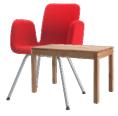
Labeling a chair by its common name--"chair"--makes it more difficult to remember whether you've seen
this particular chair before.
(Lupyan, in press. JEP:G.
Conceptual Grouping
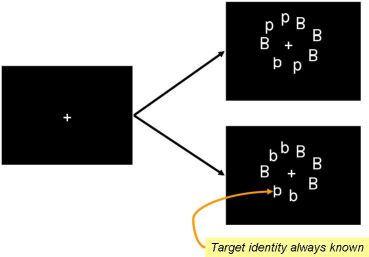
Do items from a common conceptual category group together, controlling for perceptual similarity? What are the mechanisms of such effects?
(Lupyan, 2007; under review
The Label Feedback Hypothesis

I have been advancing the view that verbal category labels may modulate conceptual and more stimulus-driven "perceptual" representations through top-down feedback. As one learns to name category exemplars, the label becomes progressively more associated with features that are typical/diagnostic of the category, and dissociated from irrelevant features. As the label becomes active during a task (such as when an individual labels or hears the name of something), the stimulus-driven aspects of the representation become augmented by top-down information from the broader category. As a result, the label can change what one sees and the processing of multiple elements in a display. I have been testing this Label Feedback Hypothesis using recurrent connectionist models, such as the one above, and using a number of behavioral paradigms such as visual search, mental rotation, object-detection
Language and Vision
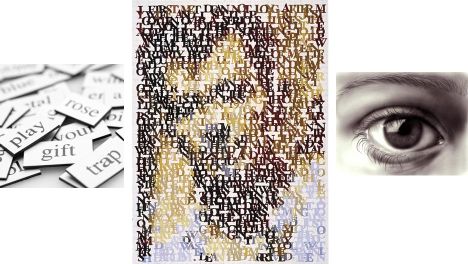
The Label Feedback Hypothesis predicts that hearing a label like 'chair' temporarily makes one a better chair detector. The next three projects test this prediction.
Effects of uninformative cues on visual processing
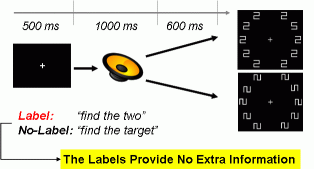
Does hearing the target label (hear, "two"), enable one to find it faster? Even when one already knows what the target and non-targets are (thus making the cue uninformative)?
(Lupyan, 2007; in prep
Category Based Attention
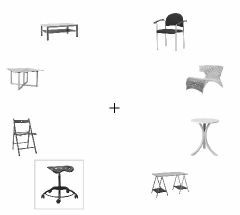
Is it possible to simultaneously attend to multiple objects from a common category? What is the effect of category labels
in one's ability to extend attention based on category membership? What is the effect of labels in attention spreading to all items within a given category?
Effects of cuing on object detection
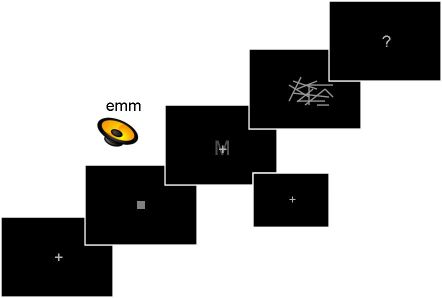
The hypothesis that labels affect visual processing can be tested more directly using object detection tasks. Does getting a visual or auditory cue improve one's ability to detect the cued object (as measured by d')?
To what degree does categorization depend on language function?
"Language is not only a means to communicate thinking; it is also a means to support it, to fixate it. Defect in language may thus damage thinking” (Goldstein, 1948).
[All tested subtypes of aphasic patients are] "deficient if the task requires isolation, identification, and conceptual comparison of specific individual aspects of an event,” but are equal to controls "when judgment can be based on global comparison” (Cohen et al., 1980).
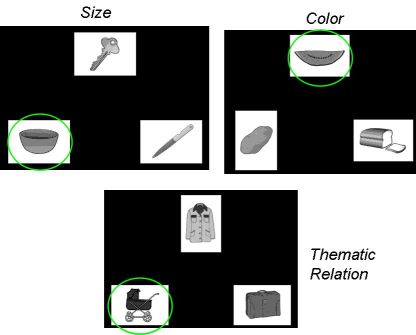
Does verbal interference produce similar effects to aphasia in object categorization tasks? Yes it does. Lupyan (in press, Psychon. Bull. and Review.)
Is there a relationships between social and linguistic structure?
In collaboration with Rick Dale (U. Memphis) I am studying relationships between grammatical structure of languages (particularly morphology),
and socio-demographic information. We are doing this using we are using large-scale databases, making this the first large-scale nomothetic analysis of language-culture
to show that the structures of individual languages are
relationships. We show that grammatical structures are partly predicted the social environment in which the languages are spoken.
This work is challenging the common assumption that language structures (like grammar) are independent of the large-scale social dynamics of usage.

This image shows a small subset of our dataset -- some languages of Papua New Guinea. (click for a larger version). Lupyan & Dale (under review)









